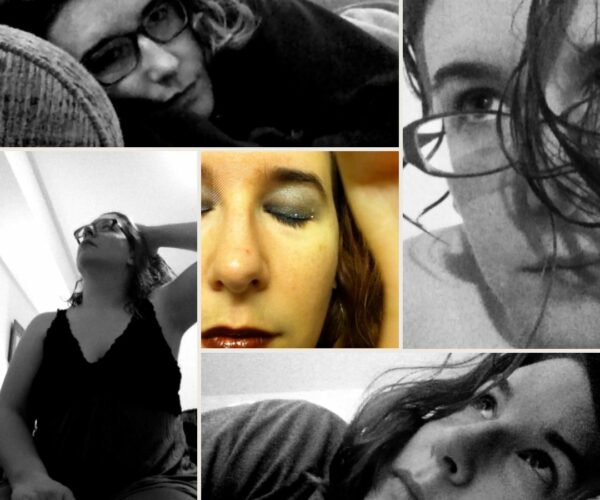I woke up this morning like I do most mornings, in severe amounts of pain. With ankylosing spondylitis (AS), one of the main symptoms is morning stiffness, and so my back and hips feel creaky and stuck. My feet, one of the peripheral areas I experience a lot of inflammation, have been especially bad lately and it hurts to bear any weight on them, as well as to point or flex them. My shoulder aches, and my head and jaw throbs. I feel my teeth and they are wiggly from another night grinding them, and I contemplate how much longer my four cracked teeth will hold out for me before my grinding and clenching completely splits them in two.
Next to me, my girlfriend lies, completely unaware of my pain. She tells me about her strange dreams and begins talking about wanting coffee. I struggle to comprehend what she is saying or follow the conversation as I’m in too much pain. I feel tears threatening to escape, but I pull them back. I just lay next to her, and she has no idea what I’m experiencing.
Pain as a Burden
At some point in life, my brain adopted the belief that expressing my needs or complaining made me a burden. Perhaps someone directly told me this, or maybe I picked up on it through body language and social cues. It could even be a message ingrained in me as a woman since childhood: give selflessly, but don’t have needs of your own. I’m not sure where I “learned” this lesson, but it has become ingrained deeply within me. I don’t want others to worry about me or be burdened by my pain. As such, I often choose to stay silent.
I’m sure there is an element of self-preservation in this mindset as well. By not verbalizing my pain it might feel less “real” in theory. However, the reality is that our bodies don’t work that way. Pain exists within us, regardless of whether it is named or not.
I also have this desire to be stronger than I am. I wish I could simply ignore the pain (or not have it at all) and face life on my own terms. It’s like I want to pretend that what’s happening in my body isn’t happening.
The truth is, the pain is always there when I wake up in the morning, whether I acknowledge it or not. And yes, the pain is a burden. It is a burden that I work through every day, and something that I struggle to navigate. That, however, does not make me a burden, and this is a truth I’m still learning to recognize.
Allowing Others to See Our Truths
Later in the day, I received a text from my girlfriend: “I wish you’d tell me when you’re hurting. I just want to know your truth.” I was immediately reminded of a therapist I had years ago who told me that I was good at masking both my emotional and physical pain. “Let your mask down a little, Angie,” she chided me, “People can’t help you if they can’t see you’re hurting.”
Over the years I’ve gotten so good at just moving through the pain that it is rare that I let people see the pain I’m in. But I’m beginning to realize (a lesson that I think I’m relearning over and over) that in trying to keep my girlfriend, my therapist, my kids, my friends, my family from seeing my pain, I’ve been denying them access to a very real part of myself. By trying not “burden” them with the pain that burdens me, I’ve hidden the truth of my existence from them.
I’ve always been seen as a very optimistic person, with rose-colored glasses. I’m the one who usually is writing uplifting essays full of hope, cheering on my friends, or helping people see the positive in things. I think a part of me worries that if I start letting people (including myself) in on the realities of my pain, I’ll lose that optimistic part of myself that I love and cherish.
Multiple Truths
Currently, my teenager and I are enrolled in a Dialectical Behavioral Therapy (DBT) program, where one of the core principles is the ability to hold two opposing truths simultaneously. We are encouraged to use the word “and” to acknowledge and accept these contrasting realities.
So here I am, sitting with the pain my body, my girlfriend’s words saying she wants to know my truth, and my therapist’s admonishment to let my mask down, and I contemplate this concept of dialectical thinking.
My truth — all our truths — can be multifaceted and multidimensional. When we admit this to ourselves and to our loved ones, we are not only free to be ourselves, but we give people the opportunity to love us and show up for us in new ways. We give others the chance to love our full selves, to provide support they may have not known was otherwise needed, and to assist us in getting whatever help we may need to better navigate our days. We also give ourselves the chance to be more accepting and loving to the complexities of our beings, and to ask for the help we may need.
My truth is that there are mornings of pain where it all feels too much. My truth is that there are days where depression overwhelms me.
I can be an optimistic person AND also go through rough times. I can have hope for my future as a chronically ill person AND still admit that I’m in pain and struggling. I can experience and admit to my pain AND not be a burden.
I can be not okay.
Be a More Proactive Patient with ArthritisPower
Join CreakyJoints’ patient-centered research registry to track your symptoms, disease activity, and medications — and share with your doctor. Sign up.






